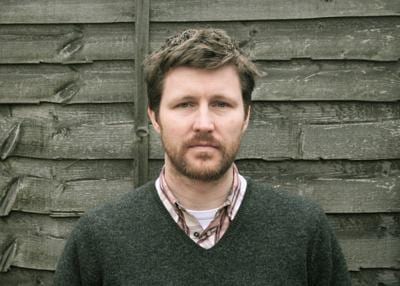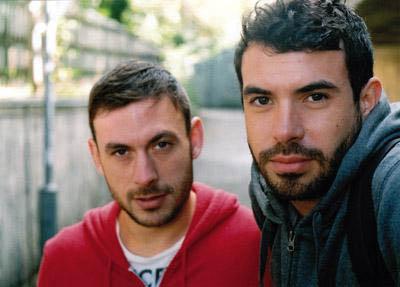
Weekend director Andrew Haigh worked previously as assistant editor on big-budget films Blackhawk Down and Gladiator. This is his second feature, after 2009's Greek Pete: A Year in the Life of a Rent Boy.
UPDATE 8 NOV, 2011 – The awards keep rolling in for the gay themed movie Weekend. Montreal’s image+nation lgbt film festival has awarded a special prize for interpretation to Tom Cullen and Chris New, the two lead actors in the film.
“With disarmingly natural performances, the two actors transport us into the loving intimacy of a memorable weekend,” reads a festival release.
Image+nation wrapped up the 24th edition of the festival on November 6.
16 MAY, 2011 – Tender, talky and intensely sexy, Andrew Haigh’s Weekend could reductively be described as a sort of gay Before Sunrise. Over the course of its titular timeframe, the film follows Russell (Tom Cullen) and Glen (Chris New), two men who extend their blurry and drunken one night stand into 48 hours to remember. Russell is a pragmatic and semi-closeted lifeguard; Glen is a stubborn intellectual who “doesn’t do boyfriends.” Their star-crossed romance is quite perfectly executed by director Haigh, who lets the film quietly creep up on the viewer as a powerful new entry into the queer cinema lexicon.
Watch Knegt’s conversation with Haigh:
Coming off an award-winning debut at the SXSW film festival in Austin, Texas, the film is making its Canadian premiere as the centrepiece hala of the Inside Out Toronto LGBT Film and Video Festival. The UK import has drawn rave reviews from critics, heralding director Haigh’s delicate approach to relationship drama. Having previously worked as an assistant editor on films like Gladiator and Black Hawk Down, he brings us perhaps the furthest possible thing from those big-budget action films with Weekend.
Xtra: Why did you decide to make this film?
Andrew Haigh: I really just wanted to make something authentic about two guys falling for each other, a film that dealt with the queer issues honestly and realistically but at the same time was not just about being gay. I was very keen for the film to have wider resonance and to touch on more universal issues and concerns.
Xtra: It works so well because of the intimacy you facilitate between your main characters. As a director, how did you go about pulling that off?
AH: This was perhaps the key to making this film. We tried at every stage to create an environment that allowed for this intimacy. We kept the crew tiny and friendly. We made sure the normal trappings of making a film were kept to a bare minimum. From the very start Tom, Chris and myself spent a lot of time together, just getting to know each other, hanging around on set, lying about, talking about all kinds of stuff, and so when the camera was switched on, the intimate tone hopefully remained.
Xtra: Was it entirely scripted?
AH: On the whole it was scripted, and during the writing process I spent a long time trying to get it to feel as natural as possible. I wanted the film to feel improvised but not actually be improvised. Although during the shoot the actors were always encouraged to play around with what was written, changing things as they felt appropriate, staying true to the spirit and structure of what was written, if not the exact words. I think the naturalism that comes across is helped enormously by the way the film was shot, shooting in order, using long takes with no coverage. I approached the shoot almost as a documentary.
Xtra: The film rarely goes into explicit discussion of issues, but in not saying much, it actually says loads about identity, sex and relationships.
AH: I was thinking about the film; I just tried to stick to the story I was telling. I tried to make it about the people first and the issues second, which, I suppose, is how it works in real life. Your belief system and reaction to the world comes out of your own experiences; the issues that define your life are engrained in your own very personal histories, and so that was always the foundation of my approach. Make it about real people and let the issues come from them and not the other way around. My intention for the film was also not to force a message on the audience; I wanted them to come away with their own impressions. I think to me the film is more of an acknowledgement of how hard it can be to get what you want from life, how difficult it can be to work out who you are and how you want to live, but that it is possible.
Xtra: Your film is screening at Inside Out here in Toronto. Was there any hesitation in doing so? It seems there’s a concern among queer filmmakers to avoid being pigeonholed by screening at queer festivals.
AH: That’s a good question and it is a concern. I am well aware that the film is about gay people and I am not embarrassed about that, but neither do I want it to be confined to a gay niche. There are many things that define a story, just like there are many things that define a person. And so I don’t see Weekend as simply a gay film. In terms of strategy, I think it’s about finding a balance. It would seem crazy to not play at gay festivals, but that doesn’t mean we have to play at only gay festivals.
Xtra: What were some of your cinematic inspirations for the film?
AH: I’m a massive fan of modern so-called American neo-realism, if that is what you call it, filmmakers such as Kelly Reichardt, Ramin Bahrani, Aaron Katz. They are filmmakers that tell small stories about big subjects but anchored in the everyday.
Xtra: As far as non-cinematic inspirations are concerned, have you ever had a weekend like the one in Weekend? Was there one in particular that inspired the film?
AH: That would be giving far too much away, but there have certainly been one or two weekends in my life that I may have used for inspiration!

 Why you can trust Xtra
Why you can trust Xtra


